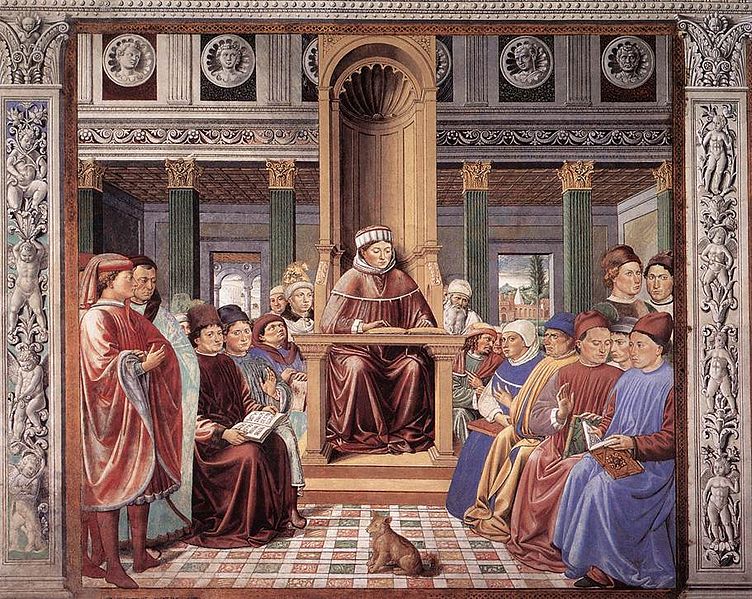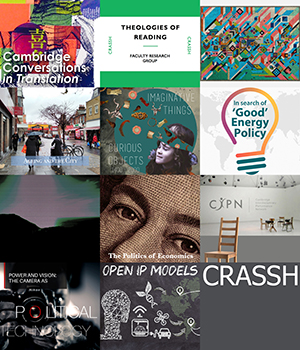Theologies of Reading is one of eleven interdisciplinary CRASSH Research Groups running fortnightly seminars in the academic year 2017-18. Ruth Jackson, a former Research Associate on the ERC-funded project Bible and Antiquity in Nineteenth-Century Culture, introduces the group on behalf of its three convenors (Simone Kotva, Laura Kilbride and Ruth Jackson). Would you like to attend? Click here to view their programme of events.

Q. Ruth, how did Theologies of Reading come about?
Last year, as part of the CRASSH research project Bible and Antiquity in Nineteenth-Century Culture, a colleague and I ran a day-conference entitled Theologies of Reading in the Nineteenth Century. My co-convenors Simone and Laura were involved. We were looking in particular at the relationship between secularity and literature, and the emergence of ‘English literature’ as a university subject in its own right. One of our speakers drew similarities between the way readers in this period treated Shakespeare’s corpus on the one hand, and the Bible on the other. Tied up with both of these works, of course, were questions concerning authorial identity, the purpose or goal of the texts, how the texts should be read, and the ‘correct’ or standard interpretation. As a group, we discussed what sort of theological assumptions lay behind nineteenth-century reading practices: questions about truth, meaning, and how people believed reading texts affected the way they lived their lives. It is true that by the 18th century, some European scholars were arguing that the Bible could and should be read ‘like any other book’. But what did this mean, and what was at stake in this question?
Following this historical examination of specifically nineteenth-century reading practices, Simone, Laura, and I were impelled to pitch a seminar series that would be broader in scope – taking in a number of different theories of interpretation and reading practices.
Q. By definition, a CRASSH research group has an interdisciplinary question at its core. What’s yours?
Why and how do we read?
We often speak about reading today in a way that reduces it to the process of getting content. In other words – the popular imagination often treats it as a process that could be done much more efficiently, if only we could plug a memory stick into our brains and download a bunch of data from it. This notion of reading is bolstered by the habits of the tabloid press and by social media, where the value of a piece is seemingly tied up with how quickly and easily it can be accessed and skimmed through. How quickly and easily, that is, the reader can get a kick out of the information. Reading is thereby rendered a matter of consumption and personal entertainment. But to envisage it as such makes us less likely to consider whether a person is changed or affected by their encounter with a text, whether or not the meaning of the text is independent from the reader, or whether the text demands a certain method of reading from us.
Our interdisciplinary research question pushes against this practice – all too common, I think – of assuming reading to simply be about acquiring information. In our seminars, we’re asking about the development of particular reading habits and methods of interpretation, from ancient religious practices to philosophical approaches through to contemporary literary-critical methods. Our overall purpose is to discuss how reading in the twenty-first century remains interested in questions of truth and meaning.

St Augustine Teaching in Rome (Scene 6, South Wall) 1464-65 Fresco, 220 x 230 cm Apsidal chapel, Sant’Agostino, San Gimignano, via Wikimedia Commons
Q. Could you tell us a bit more about your convenors, speakers and attendees, and the perspectives they bring to the discussion?
We convenors have each in our own way studied some aspect of nineteenth-century hermeneutical theory (which is not the only thing bringing us together, but it’s a start!). However, whereas Simone and I are theologians, or philosophers of religion, Laura is a research fellow in English literature, and is particularly interested in the relationship between poetry and theology.
In each of our seminars we look at a different reading practice, and our speakers – two each time – reflect contrasting perspectives on the practice in question. We’ve so far heard (for example) from philosophers, linguists, an anthropologist and scholars of literature, as well as a Benedictine monk and scholars of Islam and Judaism. Our attendees come from an even more diverse range of disciplines. Most of us can read.
Q. What were the highlights and/or challenges of your first term as a research group?
With an interdisciplinary group you have to try and strike the right balance between i) recognising dissonance (sometimes irreconcilable) between disciplinary perspectives, and ii) trying to create some sort of meaningful conceptual unity between participants, so that discussion can actually fruitfully take place. One thing I’ve really enjoyed about our seminar series so far, and which I think is working to establish this balance, is that we’ve been studying a short text together as a group each week. Examples would be – a selection of Kafka’s short stories, the prologue to The Rule of St Benedict, or comparative translations of some lines from a Rilke poem. In each case, our seminar speakers have chosen the text because it either exemplifies or tests the reading practice in question. And looking at something concrete together like this has given our discussions a productive catalyst.
Aside from that – two themes we keep coming back to each week, and which stand out for me as highlights, are firstly the relationship that exists in the practice of reading between the meaning of the text and the way it is sounded out, or performed or pronounced. (We have been regularly reminded by our speakers that silent reading is a relatively modern invention.) Secondly, it has also been interesting to discuss the way that reading habits are connected to different ways of perceiving and inhabiting time. This Michaelmas term, our tour through reading practices developed in each of the Abrahamic faith traditions brought this issue to the fore.
Q. What can we expect from Theologies of Reading in 2018?
Our four themes for Lent term are (in order): translation; philology; rhetoric; reading and fundamentalism. Then, in Easter term, we’ll consider: reading and the law; the media; therapeutic reading; computational reading.
If you’d like to join our mailing list, or to sign up to attend a particular session, then you can contact us via rej34@cam.ac.uk. I can also be contacted on Twitter at @RuthxJackson.

About CRASSH Research Groups
The CRASSH Research Groups Programme supports groups of Cambridge graduate students and faculty members with a common interdisciplinary research interest, bringing together early-career researchers, established academics and guest speakers on particular research topics for a year of collaborative work. The groups run bi-weekly events which are free and open to all.
Do you have an exciting, new idea that needs detailed exploration? Apply to us for funding.

